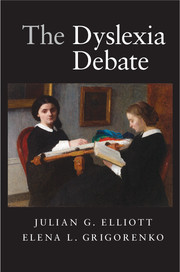Preface
Published online by Cambridge University Press: 05 April 2014
Summary
In every country and in every language, a significant proportion of children struggle to master the skill of reading. Whereas many children gradually overcome their initial difficulty and acquire functional literacy, there is a significant proportion of children who continue to encounter decoding difficulties throughout their childhood and whose problems, although not necessarily with decoding per se, persist into adulthood. As these individuals struggle to cope with the changing demands of school and wider life, the hardship and difficulties that typically result are often incapacitating, undermining, and distressing. Given such a scenario, it is understandable that there is often a strong desire on the part of these individuals, their families, and their teachers for some form of clinical diagnosis that can help explain the reasons underpinning these problems and that can indicate, and secure, effective forms of intervention.
It is hardly surprising, therefore, that the term most frequently used to describe this phenomenon – referred to here as developmental dyslexia – has such a strong resonance. For many, the term describes a biologically based condition that, importantly, can serve to remove any impression others may have that reading problems are a consequence of low intelligence or an impoverished environment. It is widely believed that once developmental dyslexia (hereafter, dyslexia) is diagnosed, appropriate specialized interventions can be set in place that have proven success in addressing this condition. Concomitantly, it is feared that a failure to diagnose this condition will result in erroneous understandings of the underlying problem and the continued operation of an inappropriate educational diet. The natural desire for such a label can also be heightened by the (often very true) belief that gaining this may be a necessary means to acquire additional resources of one kind or another.
- Type
- Chapter
- Information
- The Dyslexia Debate , pp. ix - xiiPublisher: Cambridge University PressPrint publication year: 2014



